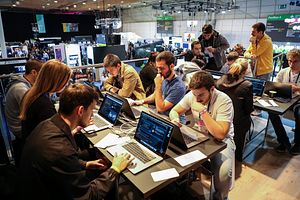LISBON — From November 6 through 9, Lisbon held the second edition of the “Web Summit” (WS) – arguably the largest and most prestigious technology conference in the world today. In gathering around 60,000 attendees in 2017, this Euro-American enterprise transformed Portugal’s beautiful capital city into a Mecca for startups, digital entrepreneurs, futuristic designers — all sorts of people who are keen to know the wonders of tomorrow. This year’s WS opening night brought together Oxford University’s famed scientist Stephen Hawking and the United Nations Secretary-General António Guterres as keynote speakers. In recognition of such ambition and magnitude, U.S. news corporation Bloomberg has recently dubbed the WS “Davos for geeks.”
WS comprises a pool of two dozen smaller conferences, so to speak. As subjects covered by this innovation-bound event may range from talking robots to flying cars, through a wide variety of thematic domains, its organizers have wisely decided to dedicate one of their slots to reflections on the sensitive relations between politics and technology. That resulted in the “Forum” – a high-profile reunion where 500 leaders, pundits, think tankers, academics, and media professionals from diverse countries, fields of expertise, and industries met and exchanged views on international affairs for three long days. Because it was an invite-only zone, conversations were supposed to flow in a frank and informal manner.
By scanning 2017 the WS Forum’s program, one would instantly infer how peripheral the topic of Asia’s rise still seems to be – at least in the judgment of WS content curatorship. Besides not properly covering the latest Asian tech dynamics, not even one amid more than 50 panels was fully focused on debating Asia and the Pacific — a pity if one recalls the role played by tech powerhouses such as Japan, South Korea, China, and Taiwan. In their defense, WSF masterminds could truthfully claim that Jessica Tan, a Singaporean Parliament member, was invited to give her views on conference day three. Granted, but definitely not enough.
However, Asia was not completely neglected at Web Summit 2017. The conference is overwhelmingly large – and there surely were a host of Asian guests, most of them expats currently based in the United States, offering their opinions here and there. But WSF – the political core of the Lisbon-based event – was not exactly an Asia-friendly environment. From what I could see and tell – I myself was a guest speaker – not many positive references to East Asia came from my fellow colleagues. Au contraire.
For obvious reasons, China was number one in citations at the WSF sessions this year. Whereas the majority of speakers would condemn Beijing for not putting into practice the liberal playbook for internet users – thus failing to provide their citizens with the basic right of access to information – other participants argued – in a somewhat condescending way – that Xi Jinping’s totalitarian web surveillance was not that distant from what happens in some self-defined liberal democracies in the West, and namely in the United States under Donald Trump, with the noticeable difference that, in lieu of promoting the interests of the Communist Party, the American federal administration claims to be protecting the people from evil terrorists.
Reporters Without Borders’ Élodie Vialle just presented a world map where territorial units were clustered in accordance with their (perceived) commitment to online freedom. Unsurprisingly, China – alongside Russia – were considered to be “the bad guys,” as she herself put it. India also appeared as a footnote on Brett Solomon’s talk, since Delhi has systematically confiscated the right to internet connections from those who live in the region of Jammu and Kashmir. Another negative mention targeted Southeast Asia, which was introduced in Angel Nguyen’s narrative as an example of people trafficking through digital means. The New York Times’ Jim Yardley bluntly asked “Who in the West should take the lead?” as the Robert Schuman Centrer’s Brigid Laffan declared the Brexit episode – not Asia’s emergence and the sovereigntist discourse that comes with the package – to be a landmark for the ongoing process of “deglobalization.” All of these speakers delivered truly interesting comments, if a bit ethnically biased.
The one and only nominal reference to Asia in a WSF panel title involved China and its intriguing ambivalence toward Europe – they were provocatively dubbed “frenemies” by WSF program formulators. The argument goes as simply and straightforwardly as that: Europe definitely needs China and should be friends with Beijing. Notwithstanding, their interactions are very often marked by tensions and disagreement, not to say ruthless competition (especially across the African continent, just to bring up a most evident case). Here, again, Asia is far from being portrayed in a benevolent fashion. And guess what? There were no Chinese speaker for this panel on China.
A few loose concepts – “G-Zero World,” “New Multilateralism,” “Post-Brexit Empire” etc. – showed up during the conference, as speakers tentatively explained and signaled the advent of a brand new international order. Almost no one, however, would take the bull by the horns, and call the rise of the Asia-Pacific by its own name. Quite tellingly, one hypothetical reason for it was offered by an African participant, iamtheCODE’s Mariéme Jamme, according to whom the West has not yet developed a novel mindset to deal with contemporary non-Western peoples and their feats. She could possibly be right. It’s about time to leave West-centric notions behind. May the 2018 Web Summit Forum edition – which is already confirmed to take place in Lisbon again – fulfill this prophecy.

































